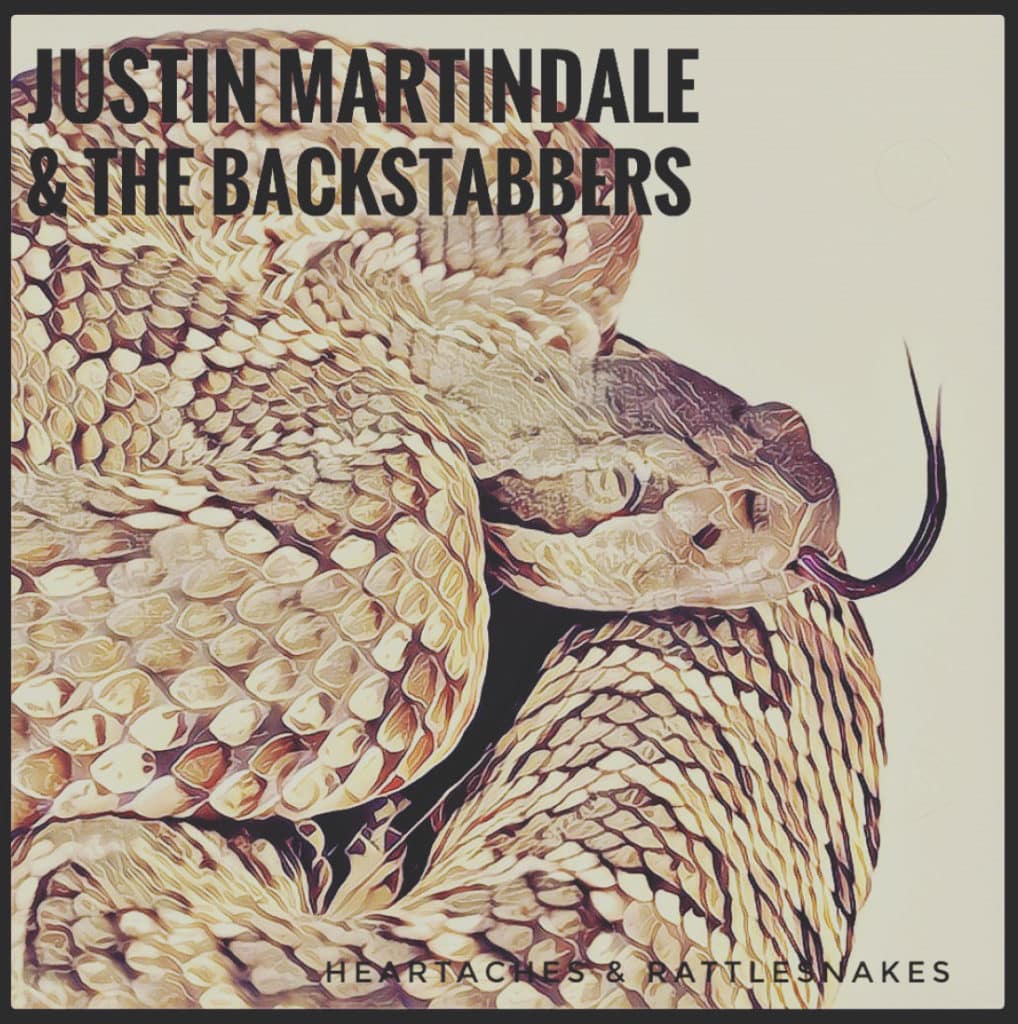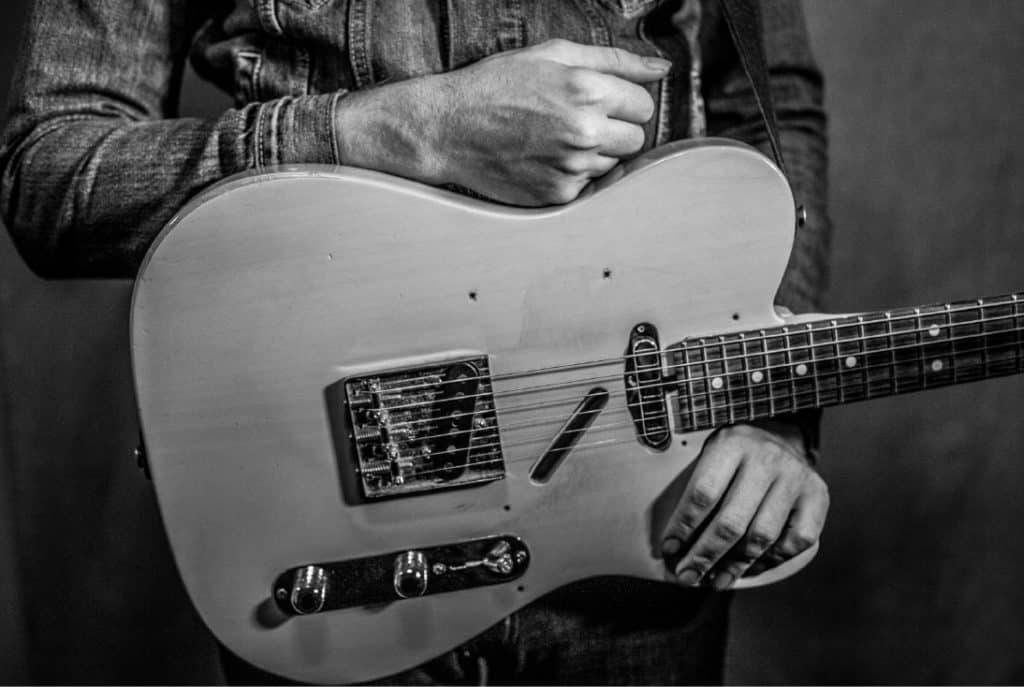Justin Martindale’s New Album Uses Melodic Songs To Spin A Story Of Heartbreak
Story By Justin Morris
Photos By Emily Martingale, Martindale Media Group

But Americana also encompasses the staying power, popularity and all-around red, white and blue that are acts such as Tom Petty and Bruce Springsteen, who are both among those who make up the “apple pie” of the classic rock era.
Somewhere among all these Americana acts, or, maybe, more accurately, crafted and molded from them, is a Lake Charles musician whose latest effort offers up a mosaic of sounds, styles and ideas that one will find fresh yet comfortingly familiar.
Justin Martindale says he wears his influences on his sleeve, and the new release Heartaches and Ratllesnakes, from him and his Backstabbers, demonstrates this. Contextually, he holds true to form; but this is a very different album for him conceptually.
When I spoke to him about the upcoming record in August, he told me the album started as a writing project about something he hadn’t really experienced: heartache. As the songs came together, he and collaborators Reese Hayes (keys and piano, co-vocals and co-songwriter on “Funny How” and “If I Could”) and Jace Verdin (bass and backing vocals) began to develop what is now the first full-length album by Justin Martindale and the Backstabbers. It follows last year’s self-titled EP. I wanted to take a look at it track by track to really find out where exactly this new, native musical road has led these musicians.
The opening track starts with a flourish that will make you smell the corn dogs and funnel cakes from the fair. Considering the theme of the project, Martindale surprisingly kicks off with a bright and happy sound. It slips into a driving but reflective monologue that deals with the “what weres” and the “what might have beens” of a love come and gone. Musically, the guitars take a bit more overdrive here than on most of the rest of the album. But this only adds to the Jersey vibe, which also shines through on a hot B3 organ solo before the band takes it home. It’s a nice, peppy opener that worked well.
“Go It Alone”
The second track is the album’s advance single and leaves the classic rock nuances of the opener behind, embracing more of the feel of a modern (not too modern, mind you), Top 40 country ballad. A bit more present in narrative, this song deals with a more immediate loss and the desire not to lose the object of one’s affection. Musically, it very much takes me to the style and arrangements of the mid-‘90’s to early ‘00’s country chart toppers — so much so, I think this song has a place on the airwaves. It would be a more than welcome break in the current status quo. There’s a huge audience for such a song and it’s a clear choice for the lead single.
“If I Could”
The first impression is the Tom Petty texture that I’d been waiting to hear shine through, since the late great rocker is Martindale’s single biggest influence. While that sound doesn’t fade, it does shift into a warm ambience with “octaved” choruses that both rhythmically and melodically give the track a somewhat Postal Service vibe. The music also highlights a John Mayer-esque bright, clean tone that’s more indicative of Martindale’s core guitar sound than, say, the opening track. Vocally, he moves out of his usual warm restraint, jumping into the upper registers. That lends cohesion to his lyrical sense of raw urgency, risk and desperation in this cut. It’s a cathartic release to close out the first third of the record.
“Funny How”
If anyone ever wanted Jackson Browne to write a song for The Avett Brothers, well, here ya go. This slow, burning, piano-driven torch song starts somewhere between Browne’s “Sky Blue and Black” and “Late for The Sky.” The vocal opening brings a new voice to the forefront — that of song co-writer Reece Hayes, who takes round 1 on the traded vocal song and delivers some seriously breathtaking harmonies behind Martindale’s round 2. Hayes’ voice channels Seth Avett in the best way possible way. Martindale’s reply, while more Isbell-esque in tone, still makes me believe this could have been a track on any Avett record. The melody has a pace and flow that won’t let go of me. These two independently fantastic voices shine together and I’m not sure there’s a better example of it than in this song. It’s a simple, wistful and heartfelt narrative that rings with beauty. It’s by far my favorite track on the record.
This mostly acoustic track marks the halfway point of the record. It addresses the decisions that are made as a relationship reaches its potentially final crossroads. It’s a very straightforward and simple song that may be a bit of an understatement in comparison to several other tracks on the record. Yet its simplicity matches the simple decisiveness of the theme — being left with only one of two options at the end of the day. Some hints of “Heartbreaker” or “Gold”-era Ryan Adams give the track a touch of familiarity.
“Something To Hold On To”
Actually the first song on this project to see the light of day, this song first appeared on last year’s EP in a live version. This version could easily have its place on the country airwaves now or even a decade ago. A touch of Isbell-esque roots country, a big helping of gospel and a little pinch of slow Louisiana rhythm deliver an old school vocal group feel (Oak Ridge Boys, Gatlin’s or Statler Brothers) in the acappella Swing Low movement. This is a tale of sweet longing and coping.
“House on Fire”
With a shift back into ambience and a good dose of classic American rock, Martindale jumps right into over-driven guitar tones and a Heartbreakers-inspired sound for a punchy, confident profession of passion, separation and dissuasion that’s like the blend of anger and desire left at the end of a love affair. This is a solid little rocker, with a bit of that speedy headiness that is falling in or out of love. It’s a good pick-up in pace after three fantastic, but slower, tracks.
“My Mother’s House”
In the most decidedly folk-styled song on the record, Martindale has a slight Appalachia-meets-the-Deep-South tone that, in its familial and descriptive feel, is akin to Trucker’s-era Isbell tracks “Decoration Day” and “Outfit.” The quiet, rolling acoustic verses spool up into a celebratory, Lumineers-like outro that gives the song a happy, nostalgic feel that separates it from the pureness of concept in the rest of the album. Still, it somehow fits the pace and feel.
“I Will Remember You”
This song is a somber resolution and poignant reflection as one finally puts the lost love to rest. In this final torch song, Martindale uses only an acoustic guitar so the warm elements of his voice, which serve the longing of the lyrics well, can emerge. As in all heartbreaks, there must come a final goodbye; Martindale chose this one to end this project. It’s a fitting and quiet end to an enjoyable collection.
You know, when it comes to songwriting and album production, many artists can thrill me in incredibly different regards. Take, for example, Brian Wilson and Jackson Browne. These are two of my favorite songwriters in spite of their great differences. Wilson challenged ideals, defied standards, and twisted and bent music (and some of the finest studio musicians the world has ever known) to his whim, and, thus, created some of the most brilliant and challenging music ever penned, while Jackson was brilliant in his simplicity, honesty and approachability. Bearing that in mind, it’s understandable that Martindale holds Browne second to only Tom Petty when it comes to songwriting inspirations.
What we are left with in this new recording is an incredibly listenable and thoroughly enjoyable project that should appeal to many people. It shows the vast amount of talent of these three musicians. I think it’s a brilliant effort for a first LP; it’s the firm, marketable first stand of a young, talented songwriter as he continues to find his true voice. Not all music is about challenging the universe; it can be just pretty music that’s easy to relate to. It can be evocative. And, sometimes, it’s honest and has a pretty melody that takes you away.
I can say that, as a young producer, Martindale may have a bit more in common with the famed Beach Boys than previously implied. Not only did he sing and pen the vast majority of the album, he was also responsible for playing all the guitar parts and the B3 organ and in his In The Pines Studio, where he recorded, produced, mixed and mastered the entire affair.
I hope you find something here that speaks to you and moves you in some capacity.
Heartaches and Rattlesnakes by Justin Martindale is available on iTunes, Google Play, Spotify and at cdbaby.com.

















Comments are closed.